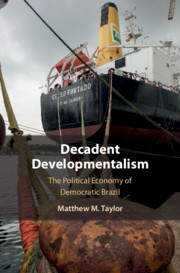Book contents
- Decadent Developmentalism
- Decadent Developmentalism
- Copyright page
- Dedication
- Contents
- Figures
- Tables
- Acknowledgments
- Abbreviations
- 1 Introduction
- Part I Complementarities in the Economic Sphere
- 2 The Macroeconomic Foundations of the Developmental State
- 3 Continuity through Change: Ideas as Ballast for the Developmental State
- 4 The Developmental Hierarchical Market Economy
- Part II Economic, Legal, and Political Control of the Developmental State
- Notes
- References
- Index
4 - The Developmental Hierarchical Market Economy
from Part I - Complementarities in the Economic Sphere
Published online by Cambridge University Press: 04 November 2020
- Decadent Developmentalism
- Decadent Developmentalism
- Copyright page
- Dedication
- Contents
- Figures
- Tables
- Acknowledgments
- Abbreviations
- 1 Introduction
- Part I Complementarities in the Economic Sphere
- 2 The Macroeconomic Foundations of the Developmental State
- 3 Continuity through Change: Ideas as Ballast for the Developmental State
- 4 The Developmental Hierarchical Market Economy
- Part II Economic, Legal, and Political Control of the Developmental State
- Notes
- References
- Index
Summary
This chapter analyzes Brazil’s 500 largest firms and financial institutions in the mid-2010s to evaluate how well corporate life fit into a Latin American variety of capitalism that Schneider (2013) termed “hierarchical market capitalism.” While Brazil adhered to the general characteristics of the hierarchical market economy (HME), Brazilian firm life differed from other HMEs in the region due to significant state activity, the presence of large but relatively undiversified business groups, and credit and equity markets with a large dose of state participation that enabled firms to behave and organize in ways that differed from their regional peers. Five characteristics of Brazilian firm life stood out: the segmented firm structure; the muscular influence of developmentalist policy tools on firms; the segmentation of labor markets; the segmentation of skills; and the segmentation of social policy provision. This segmentation had a variety of implications for firms’ incentives to participate in politics.
Keywords
- Type
- Chapter
- Information
- Decadent DevelopmentalismThe Political Economy of Democratic Brazil, pp. 90 - 118Publisher: Cambridge University PressPrint publication year: 2020

